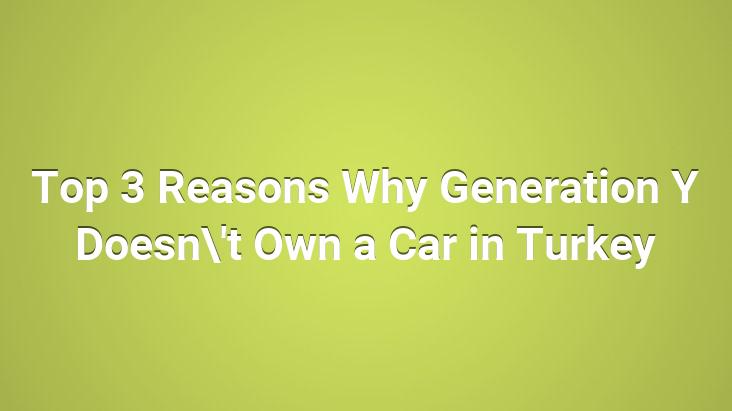According to the Deloitte report, consumers in Turkey mostly prefer cheapness, fuel efficiency and favorable payment conditions when purchasing a vehicle. looking. While 52% of Millennials state that they would prefer to use vehicles that work with alternative engine technologies, they are ready to pay more for these vehicles than European consumers. In addition, for the consumer who is more interested in safety-related technologies such as collision-free vehicles than cockpit technologies, the customer is the customer. experience and service are also very effective in the purchase decision.
Deloitte, providing services in the fields of audit, tax, corporate finance, corporate risk and management consultancy. , published the 2014 Automotive Industry Consumer Survey. The research, which was carried out with 23 thousand people in 19 countries in total, also covers Turkey.. It discusses the customer experience in Turkey and the factors that affect the final purchase decision.
Cheapness, fuel efficiency and favorable payment terms affect the purchase of a vehicle
According to a survey of 979 consumers from different age groups from Turkey, 85% of consumers in Turkey state that they want to buy or rent a vehicle in the next 5 years, while this rate remains at 73% in EU countries. The first three items that affect the purchasing decision the most are cheaper vehicles, higher fuel efficiency and favorable payment terms.
In this process, the rate of people who have never thought of buying or renting a car is 6% in Turkey, while it is 15.7% in EU countries. Although Generation, who do not currently own a car, are willing, the top three reasons for not owning a car are to meet their lifestyle needs by walking or by public transport, to reduce the cost of purchase. indicates unsuitability and high operational/maintenance costs. Among the top 3 reasons for other generations not to buy a vehicle, the cost is not affordable, and traffic congestion stands out instead of operational/maintenance costs in addition to transportation by foot or public transport.
1 out of every 2 consumers prefer to move their house rather than driving traffic
One of every 2 consumers participating in the research, It is stated that he may want to move to a place close to the workplace in order to reduce the time.. 2 out of 3 consumers aged 38 and over prefer to live in an environment where they can meet all their needs within walking distance.. 41% of millennials and 47% of other generations say they are ready to take advantage of services such as car sharing.. However, 38% of millennials and 34% of other generations say they may still be concerned about safety, security, or privacy about ridesharing.
In the study Another interesting point is that 2 out of every 3 people in Turkey want to plan their transportation with a smart phone, while this rate is quite low in Europe (1 out of every 3 people)..
Users over the age of 38 are more keen on tools that work with alternative technology
In the next 5 years, more than half of Generation Y (52%) stated that they would prefer to use vehicles working with alternative engine technologies, while this rate increased to 64% for users over the age of 38. going out. Among these alternative engine technologies, hybrid, plug-in hybrid and battery-electric vehicles stand out.
Turks are more willing than Europeans to pay for vehicles working with alternative engine technology.
While 3 out of 4 people stated that they are ready to pay more for alternative technologies than gasoline and diesel vehicles, they say they will pay more. 1 out of 2 people say this difference will be $2,000 or more. In Europe, this rate is behind Turkey and only 2 out of 3 people state that they are ready to pay more.. However, although consumers state that they are ready to pay more for alternative engine technologies, cost rather than environmental awareness still appears to be the most important factor in their decision.
Consumers in Turkey are alternative fuels. He thinks that vehicle users who prefer motors that use motors should be rewarded (Generation Y 59%, other generations 70%) and manufacturers should be encouraged by the state to produce these vehicles (Generation Y 62%, other generations 71%).
It is believed that non-collision vehicles will benefit the most
Consumers in the study found that easy parking instead of cockpit technologies such as in-vehicle assistance systems; They state that they find technologies more useful to detect the presence of other vehicles on the road, prevent collisions, make them feel safe and secure, prevent them from driving dangerously, and warn them when they exceed the speed limit.. While 65-75% of users say that non-collision vehicles will provide the greatest benefit, 59-67% of users favor full driverless vehicle use.
Consumer vehicle trusts the word of family and friends when buying
The majority of consumers in Turkey do an average of 10 hours of research before purchasing a vehicle and More than 90% evaluate 3 or more brands in this process. Family members and friends (67%) are the ones who help the purchasing decision the most.. It is followed by manufacturers’ websites with a rate of 57%.. This rate is as low as 36% for European consumers.. Other factors affecting the purchase decision include vehicle reviews (54%) on independent sites, news and media reviews (52%), sales staff at the dealership (43%), and social networking sites (36%).
At least 2 out of three people think the service is very important
The cost and quality of service packages are important for at least 70 users under the age of 38. While 42% of consumers are ready to pay more for services that will make their lives easier, this rate is 33% in Europe and 44% in America.
Improving the customer experience is critical as well as the product
8 out of 10 consumers want the purchasing process to be highly efficient. Here, too, it is important for manufacturers to develop processes such as obtaining information, test drives, document and registration processes, financing processes and simple maintenance services much faster and more effectively, and to provide services that will provide convenience and comfort to customers.
Consumer expectations will shape business models
Consumers will continue to use vehicles no matter how However, the fact that the total cost of vehicles is the biggest obstacle to purchase will cause consumers to look warmly to alternative transportation options such as car sharing and improved public transportation methods.. This means diversification of the competitive landscape for vehicle manufacturers.. For this reason, manufacturers that are open to new collaborations and ways of doing business by taking into account opportunities outside of traditional business models will be one step ahead of others.







